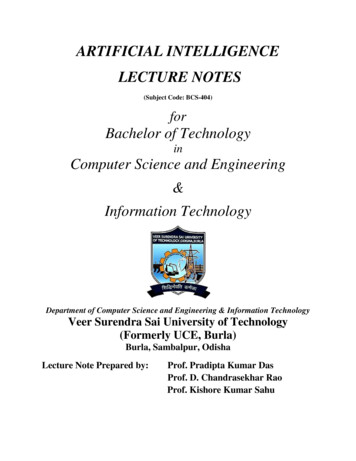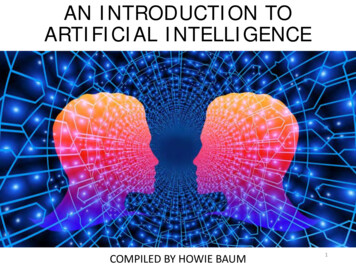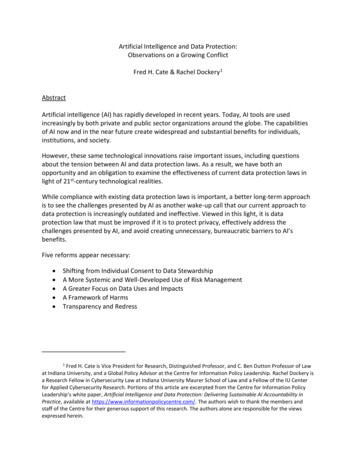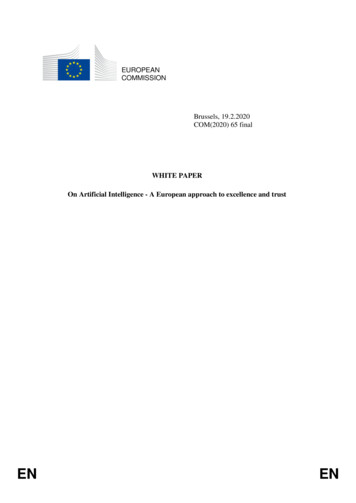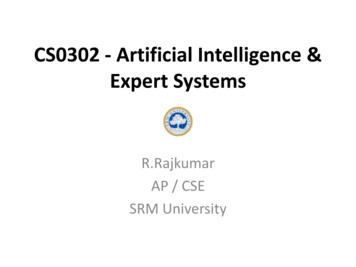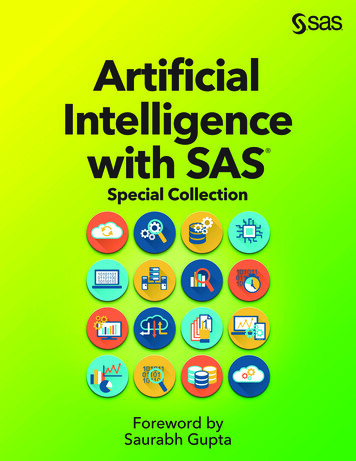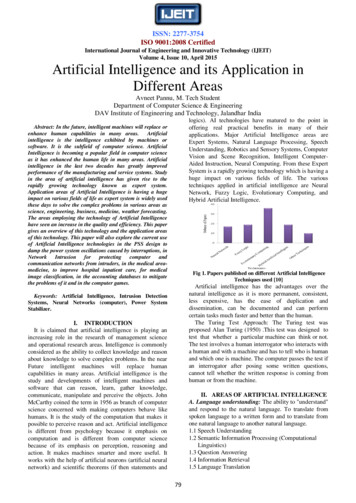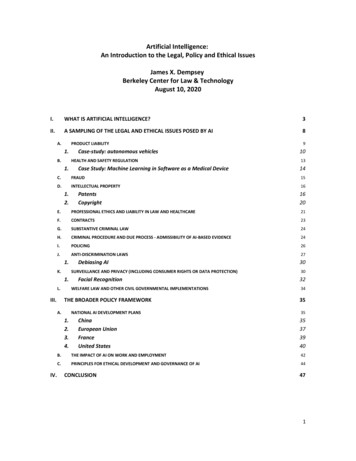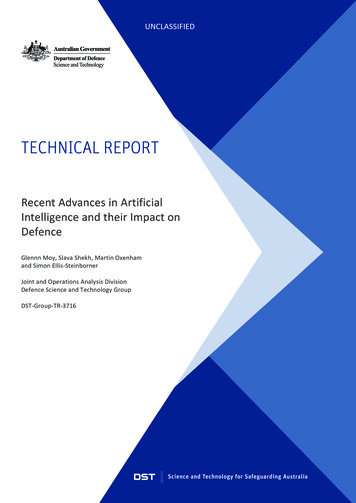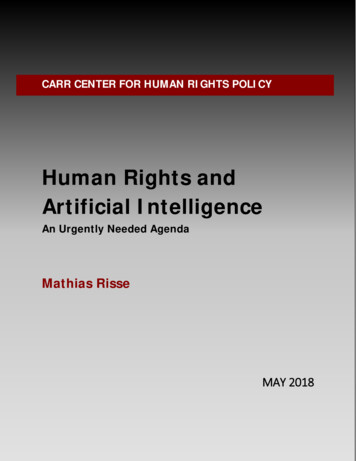
Transcription
CARR CENTER FOR HUMAN RIGHTS POLICYHuman Rights andArtificial IntelligenceAn Urgently Needed AgendaMathias RisseMAY 20181
Carr Center for Human Rights PolicyHarvard Kennedy School79 JFK StreetCambridge, MA 02138www.carrcenter.hks.harvard.eduStatements and views expressed in this paper are solely those of the authors and do not implyendorsement by Harvard University, the Harvard Kennedy School, or the Carr Center forHuman Rights Policy.Copyright 2018Carr Center for Human Rights PolicyPrinted in the United States of AmericaCARR CENTER FOR HUMAN RIGHTS POLICY
Human Rights andArtificial IntelligenceAn Urgently Needed AgendaMathias Risse is Professor of Philosophy and Public Policy. His work primarilyaddresses questions of global justice ranging from human rights, inequality, taxation, trade andimmigration to climate change, obligations to future generations and the future of technology. Hehas also worked on questions in ethics, decision theory and 19th century German philosophy,especially Nietzsche (on whose work he regularly teaches a freshman seminar at Harvard). Inaddition to HKS, he teaches in Harvard College and the Harvard Extension School, and he isaffiliated with the Harvard philosophy department. He has also been involved with executiveeducation both at Harvard and in other places in the world. Risse is the author of On Global Justiceand Global Political Philosophy, both published in 2012.PAPERMAY 2018
ContentsIntroduction . 1AI and Human Rights. 2The Morality of Pure Intelligence . 5Human Rights and the Problem of Value Alignment . 8Artificial Stupidity and the Power of Companies . 11The Great Disconnect: Technology and Inequality . 12Literature . 16
IntroductionArtificial intelligence generates challenges for human rights. Inviolabilityof human life is the central idea behind human rights, an underlyingimplicit assumption being the hierarchical superiority of humankind toother forms of life meriting less protection. These basic assumptions arequestioned through the anticipated arrival of entities that are not alive infamiliar ways but nonetheless are sentient and intellectually and perhapseventually morally superior to humans. To be sure, this scenario maynever come to pass and in any event lies in a part of the future beyondcurrent grasp. But it is urgent to get this matter on the agenda. Threatsposed by technology to other areas of human rights are already with us.My goal here is to survey these challenges in a way that distinguishesshort-, medium-term and long-term perspectives. 1For introductory discussions of AI, see Frankish and Ramsey, The Cambridge Handbook ofArtificial Intelligence; Kaplan, Artificial Intelligence; Boden, AI. For background on philosophyof technology much beyond what will be discussed here, see Kaplan, Readings in thePhilosophy of Technology; Scharff and Dusek, Philosophy of Technology; Ihde, Philosophy ofTechnology; Verbeek, What Things Do. See also Jasanoff, The Ethics of Invention. Specificallyon philosophy and artificial intelligence, see Carter, Minds and Computers. For an earlydiscussion of how the relationship between humans and machines may evolve, see Wiener,The Human Use Of Human Beings. That book was originally published in 1950.11
AI and Human RightsAI is increasingly present in our lives, reflecting a growing tendency to turn for advice,or turn over decisions altogether, to algorithms. By “intelligence”, I mean the ability tomake predictions about the future and solve complex tasks. “Artificial” intelligence, AI,is such ability demonstrated by machines, in smart phones, tablets, laptops, drones,self-operating vehicles or robots that might take on tasks ranging from householdsupport, companionship of sorts, even sexual companionship, to policing and warfare.Algorithms can do anything that can be coded, as long as they have access to data theyneed, at the required speed, and are put into a design frame that allows for execution ofthe tasks thus determined. In all these domains, progress has been enormous. Theeffectiveness of algorithms is increasingly enhanced through “Big Data:” availability ofan enormous amount of data on all human activity and other processes in the worldwhich allow a particular type of AI known as “machine learning” to draw inferencesabout what happens next by detecting patterns. Algorithms do better than humanswherever tested, even though human biases are perpetuated in them: any systemdesigned by humans reflects human bias, and algorithms rely on data capturing thepast, thus automating the status quo if we fail to prevent them. 2 But algorithms arenoise-free: unlike human subjects, they arrive at the same decision on the same problemwhen presented with it twice. 32See this 2017 talk by Daniel Kahneman: https://www.youtube.com/watch?v z1N96In7GUc On this subject,see also Julia Angwin, “Machine Bias.” On fairness in machine learning, also see Binns, “Fairness in MachineLearning: Lessons from Political Philosophy”; Mittelstadt et al., “The Ethics of Algorithms”; Osoba and Welser,An Intelligence in Our Image.On Big Data, see Mayer-Schönberger and Cukier, Big Data. On machine learning, see Domingos, The MasterAlgorithm. On how algorithms can be used in unfair, greedy and otherwise perverse ways, see O’Neil,Weapons of Math Destruction. That algorithms can do a lot of good is of course also behind much of thepotential that social science has for improving the lives of individuals and societies, see e.g., Trout, TheEmpathy Gap.32
For philosophers what is striking is how in the context of AI many philosophical debatesreemerge that to many seemed so disconnected from reality. Take the trolley problem,which teases out intuitions about deontological vs. consequentialist morality byconfronting individuals with choices involving a runaway trolley that might kill variousnumbers of people depending on what these individuals do. These decisions not onlydetermine who dies, but also whether some who would otherwise be unaffected areinstrumentalized to save others. Many a college teacher deployed these cases only tofind students questioning their relevance since in real life choices would never be thisstylized. But once we need to program self-driving vehicles (which just created their firstroadside fatality), there is a new public relevance and urgency to these matters.Also, philosophers have long puzzled about the nature of the mind. One question is ifthere is more to the mind than the brain. Whatever else it is, the brain is also a complexalgorithm. But is the brain fully described thereby, or does that omit what makes usdistinct, namely, consciousness? Consciousness is the qualitative experience of beingsomebody or something, its “what-it-is-like-to-be-that”-ness, as one might say. If thereis nothing more to the mind than the brain, then algorithms in the era of Big Data willoutdo us soon at almost everything we do: they make ever more accurate predictionsabout what book we enjoy or where to vacation next; drive cars more safely than we do;make predictions about health before our brains sound alarms; offer solid advice onwhat jobs to accept, where to live, what kind of pet to adopt, if it is sensible for us to beparents and whether it is wise to stay with the person we are currently with – based on amyriad of data from people relevantly like us. Internet advertisement catering towardsour preferences by assessing what we have ordered or clicked on before is a mereshadow of what is to come.If the mind just is a complex algorithm, then we may eventually have little choice but togrant the same moral status to certain machines that humans have. Questions about themoral status of animals arise because of the many continuities between humans andother species: the less we can see them as different from us in terms of morally relevantproperties, the more we must treat them as fellow travelers in a shared life, as done forinstance in Sue Donaldson and Will Kymlicka’s Zoopolis.4 Such reasoning eventuallycarries over to machines. We should not be distracted by the fact that, as of now,machines have turn-off switches. Future machines might be composed and networked4Donaldson and Kymlicka, Zoopolis.3
in ways that no longer permit easy switch-off. More importantly, they might displayemotions and behavior to express attachment: they might even worry about beingturned off, and be anxious to do something about it. Or future machines might becyborgs, partly composed of organic parts, while humans are modified with non-organicparts for enhancement. Distinctions between humans and non-humans might erode.Ideas about personhood might alter once it becomes possible to upload and store adigitalized brain on a computer, much as nowadays we can store human embryos.Even before that happens, new generations will grow up with machines in new ways. Wemay have no qualms about smashing laptops when they no longer perform well. But ifwe grow up with a robot nanny whose machine-learning capacities enable it to attend tous in ways far beyond what parents do, we would have different attitudes towardsrobots. Already in 2007, a US colonel called off a robotic land-mine-sweeping exercisebecause he considered the operation inhumane after a robot kept crawling along losinglegs one at a time. 5 Science fiction shows like Westworld or The Good Place anticipatewhat it would be like to be surrounded by machines we can only recognize as such bycutting them open. A humanoid robot named Sophia with capabilities to participate ininterviews, developed by Hanson Robotics, became a Saudi citizen in October 2017.Later Sophia was named UNDP’s first-ever Innovation Champion, the first non-humanwith a UN title.6 The future might remember these as historic moments. The pet worldis not far behind. Jeff Bezos recently adopted a dog called SpotMini, a versatile roboticpet capable of opening doors, picking himself up and even loading the dishwasher. AndSpotMini never needs to go outside if Bezos would rather shop on Amazon or enjoypresidential tweets.If there indeed is more to the mind than the brain, dealing with AI including humanoidrobots would be easier. Consciousness, or perhaps accompanying possession of aconscience, might then set us apart. It is a genuinely open question how to make senseof qualitative experience and thus of consciousness. But even though considerationsabout consciousness might contradict the view that AI systems are moral agents, theywill not make it impossible for such systems to be legal actors and as such own property,commit crimes and be accountable in legally enforceable ways. After all, we have ahistory of treating corporations in such ways, which also do not have consciousness.56Wallach and Allen, Moral Machines, 55.https://en.wikipedia.org/wiki/Sophia (robot)4
Much as there are enormous difficulties separating the responsibility of corporationsfrom that of humans involved with them, similar issues will arise with regard tointelligent machines.The Morality of Pure IntelligenceOne other long-standing philosophical problem that obtains fresh relevance here is theconnection between rationality and morality. This question emerges when we wonderabout the morality of pure intelligence. The term “singularity” refers to the momentwhen machines surpass humans in intelligence. Since then humans have succeeded increating something smarter than themselves, this new type of brain may well producesomething smarter than itself, and on it goes, possibly at great speed. There will belimits to how long this can continue. But since computational powers have increasedrapidly over the decades, the limits to what a superintelligence can do are beyond whatwe can fathom now. Singularity and superintelligence greatly exercise some participantsin the AI debate whereas others dismiss them as irrelevant compared to more pressingconcerns. Indeed, there might never be a singularity, or it might be decades or hundredsof years off. Still, the exponential technological advancement of the last decades putsthese topics on our agenda. 7What philosophers think of then is the dispute between David Hume and ImmanuelKant about whether rationality fixes our values. Hume famously thought reason didnothing to fix values: a being endowed with reason, rationality or intelligence (let usassume these are all relevantly similar) might have any goals, as well as any range ofattitudes, especially towards human beings. If so, a superintelligence – or any AI for thatmatter, but the issue is especially troublesome for a superintelligence – could have justabout any type of value commitment, including ones that would strike us as ratherabsurd (such as maximizing the number of paperclips in the universe, to mention anexample sometimes brought up in the literature). And how would we know that suchthoughts are misguided if indeed they are given that such a superintelligence would beby stipulation massively smarter and thus in particular different from us?Chalmers, “The Singularity: A Philosophical Analysis”; Bostrom, Superintelligence; Eden et al., SingularityHypotheses.75
As opposed to that, there is the Kantian view that derives morality from rationality.Kant’s Categorical Imperative asks of all rational beings not ever to use their ownrational capacities nor those of any other rational being in a purely instrumental way.Excluded in particular are gratuitous violence against and deception of other rationalbeings (which for Kant would always be too much like pure instrumentalization). In adifferent way of thinking about the Categorical Imperative it requires of us to always actin ways that would pass a generalization test. Certain actions would be renderedimpermissible because they would not hold up if everybody did it, as for instancestealing and lying would not: there would be no property to begin with if everybodystole, and no communication if everybody reserved the right to lie. The point of Kant’sderivation is that any intelligent being would fall into a contradiction with itself byviolating other rational beings. Roughly speaking that is because it is only our rationalchoosing that gives any value to anything in the first place, which also means by valuinganything at all we are committed to valuing our capacity to value. But trashing otherrational beings in pursuit of our own interests trash their capacities to value, which arerelevantly the same capacities whose possession we must value in ourselves. If Kant isright, a superintelligence might be a true role-model for ethical behavior. Since wecannot change human nature, and human nature if intensely parochial in its judgementsand value commitments, AI might close the gap that opens when humans with theirStone Age, small-group-oriented DNA operate in a global context. 8If something like this argument were to work – and there are doubts – we would havenothing to worry about from a superintelligence. Arguably, we would be rational enoughfor this kind of argument to generate protection for humble humans in an era of muchsmarter machines. But since a host of philosophers who are smart by contemporarystandards has argued against the Kantian standpoint, the matter is far from settled. Wedo not know what these matters would look like from the standpoint of asuperintelligence.Of course, some kind of morality could be in place with superintelligence in charge evenif value cannot be derived from rationality alone. There is also the Hobbesian approachof envisaging what would happen to humans aiming for self-preservation andcharacterized by certain properties in a state of nature without a shared authority.8Petersen, “Superintelligence as Superethical”; Chalmers, “The Singularity: A Philosophical Analysis.” See alsothis 2017 talk by Daniel Kahneman: https://www.youtube.com/watch?v z1N96In7GUc6
Hobbes argues that even though these individuals would not act on shared values just bythinking clear-mindedly, as they would on a Kantian picture, they would quicklyexperience the nastiness of life without a shared authority. Far from being vile, asindividuals they would feel compelled to strike against each other in anticipation. Afterall, even if they would know themselves to be cooperative and give the other side thebenefit of the doubt as well, they could not be sure that other side would give them thatsame benefit, and might thus feel compelled to strike first given how much is at stake.Unless there is only one superintelligence, or all superintelligences are closely linkedanyway, perhaps such reasoning would apply to such machines as well, and they wouldbe subject to some kind of shared authority. Hobbes’s state of nature would thendescribe the original status of superintelligences vis-à-vis each other. Whether such ashared authority would also create benefits for humans is unclear. 9Perhaps T. M. Scanlon’s ideas about appropriate responses to values would help. 10 Thesuperintelligence might be “moral” in the sense of reacting in appropriate ways towardswhat it observes all around. Perhaps then we have some chance at getting protection, oreven some level of emancipation in a mixed society composed of humans and machines,given that the abilities of the human brain are truly astounding and generate capacitiesin human beings that arguably should be worthy of respect. 11 But so are also thecapacities of animals, which has not normally led humans to react towards them, ortowards the environment, in an appropriately respectfully way. Instead of displayingsomething like an enlightened anthropocentrism, we have too often instrumentalizednature. Hopefully a superintelligence would simply outperform us in such matters, andthat will mean the distinctively human life will receive some protection because it isworthy of respect. We cannot know that for sure but we also need not be pessimistic.9For the point about Hobbes, see this 2016n talk by Peter Railton:https://www.youtube.com/watch?v SsPFgXeaeLI10Scanlon, “What Is Morality?”11For speculation on what such mixed societies could be like, see Tegmark, Life 3.0, chapter 5.7
Human Rights and the Problem of Value AlignmentAll these matters are in a part of the future about which we do not know when or even ifit will ever be upon us. But from a human-rights standpoint these scenarios matterbecause we would need to get used to sharing the social world we have built overthousands of years with new types of beings. Other creatures have so far never stood inour way for long, and the best they have been able to hope for is some symbioticarrangements as pets, livestock or zoo displays. All this would explain why we have aUDHR based on ideas about a distinctively human life which seems to merit protection,at the individual level, of a sort we are unwilling to grant other species. On philosophicalgrounds I myself think it is justified to give special protection to humans that takes theform of individual entitlements, without thereby saying that just about anything can bedone to other animals or the environment. But it would all be very different withintelligent machines. We control animals because we can create an environment wherethey play a subordinate role. But we might be unable to do so with AI. We would thenneed rules for a world where some intelligent players are machines. They would have tobe designed so they respect human rights even though they would be smart andpowerful enough to violate them. At the same time they would have to be endowed withproper protection themselves. It is not impossible that, eventually, the UDHR wouldhave to apply to some of them. 12There is an urgency to making sure these developments get off to a good start. Thepertinent challenge is the problem of value alignment, a challenge that arises waybefore it will ever matter what the morality of pure intelligence is. No matter howprecisely AI systems are generated we must try to make sure their values are alignedwith ours to render as unlikely as possible any complications from the fact that asuperintelligence might have value commitments very different from ours. That theproblem of value alignment needs to be tackled now is also implied by the UN GuidingPrinciples on Business and Human Rights, created to integrate human rights intobusiness decisions. These principles apply to AI. This means addressing questions such12Margaret Boden argues that machines can never be moral and thus responsible agents; she also thinks it isagainst human dignity to be supplied with life companions or care givers of sorts that are machines. Seehttps://www.youtube.com/watch?v KVp33Dwe7qA (For impact of technology on human interaction, seealso Turkle, Alone Together.) Others argue that certain types of AI would have moral rights or deserve othertypes of moral consideration; for Matthew Liao’s and Eric Schwitzgebel’s views on this, see see here:https://www.youtube.com/watch?v X-uFetzOrsg8
as "What are the most severe potential impacts?", "Who are the most vulnerablegroups?" and "How can we ensure access to remedy?" 13In the AI community the problem of value alignment has been recognized at the latestsince Isaac Asimov’s 1942 short story “Runaround,” where he formulates his famousThree Laws of Robotics, which are there quoted as coming from a handbook publishedin 2058 (sic!): (1) A robot may not injure a human being or, through inaction, allow ahuman being to come to harm. (2) A robot must obey the orders given it by humanbeings except where such orders would conflict with the First Law. (3) A robot mustprotect its own existence as long as such protection does not conflict with the First orSecond Laws.However, these laws have long been regarded as too unspecific. Various efforts havebeen made to replace them, so far without any connection to the UN’s Principles onBusiness and Human Rights or any other part of the human-rights movement. Amongother efforts, in 2017 the Future of Life Institute in Cambridge, MA founded aroundMIT physicist Max Tegmark and Skype co-founder Jaan Tallinn, held a conference onBeneficial AI at the Asilomar conference center in California to come up with principlesto guide further development of AI. Of the resulting 23 Asilomar Principles, 13 are listedunder the heading of Ethics and Values. Among other issues, these principles insist thatwherever AI causes harm, it should be ascertainable why it does, and where an AIsystem is involved in judicial decision making its reasoning should be verifiable byhuman auditors. Such principles respond to concerns that AI deploying machinelearning might reason at such speed and have access to such a range of data that itsdecisions are increasingly opaque, making it impossible to spot if its analyses go astray.The principles also insist on value alignment, urging that “highly autonomous AIsystems should be designed so that their goals and behaviors can be assured to alignwith human values throughout their operation” (Principle 10). The ideas explicitlyappear in Principle 11 (Human Values) include “human dignity, rights, freedoms, andcultural diversity.” 141314Ruggie, Just Business.https://futureoflife.org/ai-principles/ On value alignment see ficial-intelligence-with-human-values/9
Insisting on human rights presupposes a certain set of philosophical debates has beensettled: there are universal values, in the form of rights, and we roughly know whichrights there are. As the Asilomar Principles make clear, there are those in the AIcommunity who believe human rights have been established in credible ways. But othersare eager to avoid what they perceive as ethical imperialism. They think the problem ofvalue alignment should be solved differently, for instance by teaching AI to absorb inputfrom around the word, in a crowd-sourcing manner. So this is yet another case where aphilosophical problem assumes new relevance: our philosophically preferredunderstanding of meta-ethics must enter to judge if we are comfortable putting humanrights principles into the design of AI, or not. 15Human rights also have the advantage that there have been numerous forms of humanrights vernacularization around the world. Global support for these rights is rathersubstantial. And again, we already have the UN Guiding Principles on Business andHuman Rights. But we can be sure China will be among the leading AI producers andhave little inclination to solve the value alignment problem in a human-rights mindedspirit. That does not have to defeat efforts elsewhere to advance with the human-rightssolution to that problem. Perhaps in due course AI systems can exchange thoughts onhow best to align with humans. But it would help if humans went about design of AI in aunified manner, advancing the same solution to the value-alignment problem. However,since even human rights continue to have detractors there is little hope that will happen.What is in any event needed is more interaction among human-rights and AIcommunities so the future is not created without the human-rights community. (Thereis no risk it would be created without the AI community.) One important step into thisdirection is the decision by Amnesty International – the other AI – to make extensiveuse of artificial-intelligence devices in pursuit of human-rights causes. This initiativewas inaugurated by outgoing Secretary General Salil Shetty, the project leader beingSherif Elsayed-Ali. At this stage, Amnesty is piloting use of machine learning in humanrights investigations, and also focuses on the potential for discrimination within use ofmachine learning, particularly with regard to policing, criminal justice and access toessential economic and social services. Amnesty is also more generally concerned aboutthe impact of automation on society, including the right to work and livelihood. ThereOn how machines could actually acquire values, see Bostrom, Superintelligence, chapters 12-13; Wallachand Allen, Moral Machines.1510
needs to be more such engagement, ideally going both ways, between the human rightsmovement and the engineers behind this development.Artificial Stupidity and the Power of CompaniesThere are more immediate problems than intelligent machines of the future eventhough those need to be brought on their way properly. The exercise of each humanright on the UDHR is affected by technologies, one way or another. Anti-discriminationprovisions are threatened if algorithms used in areas ranging from health care toinsurance underwriting to parole decisions are racist or sexist because the learning theydo draws on sexism or racism. Freedom of speech and expression, and any libertyindividuals have to make up their minds, is undermined by the flood of fake news thatengulfs us including fabrication of fake videos that could feature just about anybodydoing anything, including acts of terrorism that never occurred or were committed bydifferent people.The more political participation depends on internet and social media, the more theytoo are threatened by technological advances, ranging from the possibility of deployingever more sophisticated internet bots participating in online debates to hacking ofdevices used to count votes or hacking of public administrations or utilities to createdisorder. Wherever there is AI there also is AS, artificial stupidity. AS could be farworse than the BS we have gotten all too used to: efforts made by adversaries not only toundermine gains made possible by AI but to turn them into their opposite. Russianmanipulation in elections is a wake-up call; much worse is likely to come. Judicial rightscould be threatened if AI is used without sufficient transparency and possibility forhuman scrutiny. An AI system has predicted the outcomes of hundreds of cases at theEuropean Court of Human Rights, forecasting verdicts with accuracy of 79%; and oncethat accuracy gets yet higher it will be tempting to use AI also to reach decisions. Use ofAI in court proceedings might help generate access to legal advice to the poor (one of theprojects Amnesty pursues, especially in India); but it might also lead to Kafkaesquesituations if algorithms give inscrutable advice. 1616http://www.bbc.com/news/technology-3772738711
Any rights to security and privacy are potentially undermined not only through dronesor robot soldiers, but also through increasing legibility and traceability of individuals ina world of electronically recorded human activities and presences. The amount of dataavailable about people will likely increase enormously, especially once biometric sensorscan monitor human health. (They might check up on us in the shower and submit theirdata, and this might well be in our best interest because illness becomes diagnosableway before it becomes a problem.) There will be challenges to civil and political rightsarising from the sheer existence of these data and from the fact that these data mightwell be privately owned, but not by those whose data they are. Leading companies inthe AI sector are more powerful than oil companies ever were, and this is presumablyjust the beginning of the
Artificial intelligence generates challenges for human rights. Inviolability of human life is the central idea behind human rights, an underlying implicit assumption being the hierarchical superiority of humankind to other forms of l
